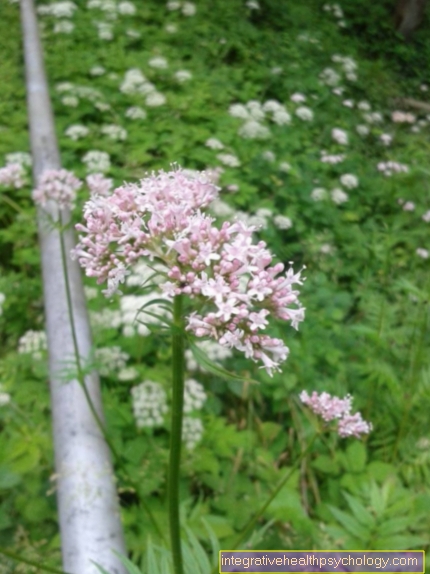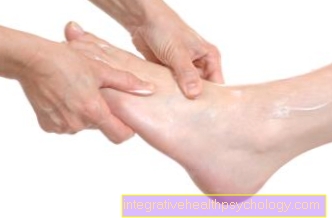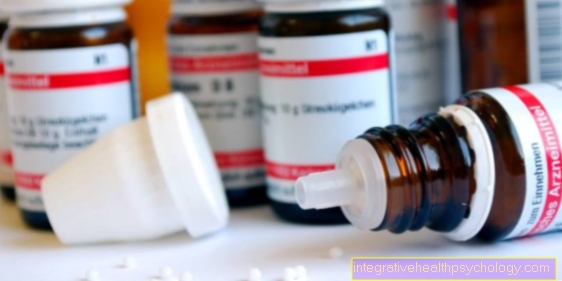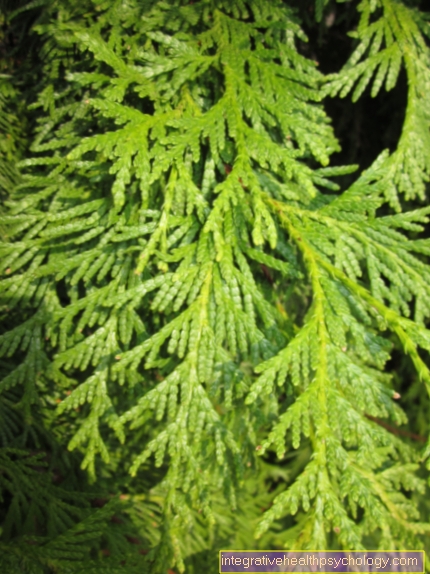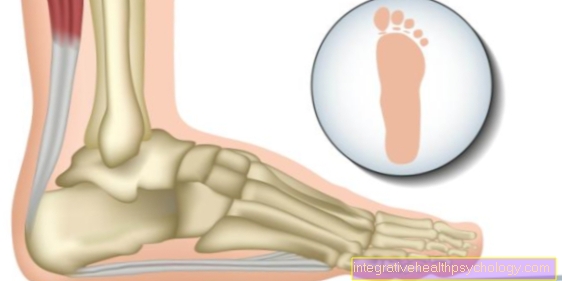Olynth®
introduction
Olynth® is a drug that is used to treat swelling of the nasal mucous membrane, as it has a decongestant effect on the mucous membrane. The nasal mucous membrane swells in diseases such as runny nose (Rhinitis), Colds and flu-like infections. It can also lead to an allergic swelling of the mucous membrane in the nose.In such cases, the swelling can be treated with Olynth®, the administration of Olynth® as a nasal spray reduces the swelling and the patient can breathe through the nose again.
In addition, Olynth® can prevent the discharge of secretions from sinus infections and otitis media (Otitis media) by the general decongestion of the mucous membranes.
Olynth® can be used in different concentrations for children and adults. Olynth® can be used as a nasal spray or as drops.

Mechanism of action
Olynth® is a drug from the Class of locally applicable sympathomimetics.
The active ingredient contained in Olynth® is Xylometazoline. This is an active ingredient from the group of Rhinologics (medicines to be used in the nose). Xylometazoline is normally used in Salt form as xylometazoline hydrochloride applied. Olynth® acts as a sympathomimetic, i.e. as a substance that Sympathetic (Part of autonomic nervous system) positively supported in its effect. In the Vessels this means that these are contracting. This is exactly the desired effect, because the swelling of the nasal mucous membrane is caused by very relaxed vessels and a resulting leakage of water. Through the contraction (constriction) of the vessels, can no more water leak out, the swelling goes down. Olynth® has these vasoconstricting properties because it is present in the vessels Alpha receptors works.
About five to ten minutes After the application, an improvement in nasal breathing is already noticeable, and the secretion can flow away better.
Side effects
Like any drug, Olynth® can have side effects, but these do occur rarely on and are by no means with every patient to be found. If side effects occur during the application, so is inform the attending physician immediately. This will inform the patient about the risks and decide whether the drug should be discontinued or whether it can be continued.
When using Olynth® occurs with a probability of one to a maximum of ten percent after the effect has ceased one increased swelling of the Nasal mucosa on (reactive hyperemia). In less than one percent of the cases it occurs when using Olynth® Epistaxis or sneezing.
Please also read: Epistaxis from nasal spray
It happens with the same frequency Effects on the heart like palpitations and accelerated pulse.
In addition, the Blood pressure rise. Additionally it can too Hypersensitivity reactions come. These are for example a skin rash or itching or also a reactive swelling of the skin and mucous membranes. Occur in very few cases (fewer than one treated patient per thousand) a headache on, this can be with fatigue and insomnia be connected.
Other side effects that only occur in less than one in ten thousand cases occur the following. It can be especially in children False perceptions come, moreover, occur in children Cardiac arrhythmias and cramps on. In general, it can lead to a particularly long-term use increased burning of the nasal mucosa and come to dehydration. These side effects can also be made worse by increasing dosages. If the use of Olynth® is continued with these symptoms it can lead to a permanent damage to the nasal mucosa and to form a so-called Smelly nose come with crust formation.
Please also read our page Dependence on nasal spray.
Contraindications
Olynth® must be avoided if one is known to allergic or hypersensitive to xylometazoline or another substance contained in Olynth® reacts. Here's another ingredient Benzalkonium chloride (a preservative contained in Olynth®), this can also trigger hypersensitivity reactions.
If you are under the so-called Rhinitis sicca (special form of chronic runny nose), Olynth® must not be used either. Furthermore, this medication must not be used if Surgical intervention carried out in advance where the Meninges exposed has been. An example here is the transsphenoidal hypophysectomy, i.e. the operative removal of the Pituitary gland through the nose.
Careful application
Before using Olynth® consult the attending physician being held:
- better known increased pressure in the eye and especially with known angle-closure glaucoma
- high blood pressure (hypertension) and other cardiovascular diseases such as coronary heart disease and Cardiac arrhythmias
- other vascular diseases, such as advanced arteriosclerosis and a Aneurysm
- Drugs that increase blood pressure, especially Monoamine oxidase inhibitors
- chronic metabolic diseases, such as Diabetes mellitus (Diabetes), Hyperthyroidism (Hypertyreosis) or the Porphyria (Red blood cell disease (Erythrocytes))
- Patients with pheochromocytoma (a tumor of the Adrenal gland)
- Prostate enlargement in older men.
Children have to especially careful are supplied. Available for children under two years special Olynth® preparations available, but it should also be the Advice from a doctor or pharmacist be obtained. Long-term use of Olynth® must be avoided in children; higher-dose preparations may only be given with the consent of the doctor.
Also special care should be taken with pregnant women appropriate. Olynth® is actually contraindicated here. It should only be used on the advice of the doctor, in special cases.
In the pregnancy must pay special attention to that Compliance with the target dosage Care should be taken, as overdosing can affect the unborn child's blood supply.
Another special case is that Lactation. While the mother is breastfeeding her child, you should be careful with Olynth®, as it too few studies there is and therefore it cannot be predicted whether complications will occur. Overdosing during breastfeeding must be avoided at all costs as this can affect the mother's milk production.
Interactions
Before taking Olynth®, it is important to ask your doctor how high the risk is that the medication you are already taking will interact with Olynth® and therefore cause it unwanted side effects comes.
When Olynth® together with tricyclic Antidepressants, Monoamine oxidase inhibitors (of the tranylzypromine class) or antihypertensive agents in general, this can lead to a uncontrolled increase in blood pressure to lead. Therefore it should be avoided to combine the mentioned drugs with Olynth®. On the other hand must no specific foods or drinks can be omitted when using Olynth®.
Ingestion
Olynth® is for them Use in the nose (nasal) and should therefore only be used there. The spray bottle is used with its tip inserted one after the other into both nostrils. A spray mist is sprayed into the nostrils by briefly pressing the spray bottle, while spraying you should inhale gently through the nose. The application can be made as needed one to three times a day respectively. The effect lasts up to twelve hours The last application should be followed just before bedtime for a peaceful sleep.
In general, there is a risk that the Passing on the spray bottle to other people Infections comes. Therefore, each individual spray bottle is only allowed to be used by one person.
Poisoning with Olynth®
If you accidentally too much Olynth® you must have taken inform your doctor immediately. Poisoning only occurs in the event of significant overdoses. However, these show clinical signs that are difficult to interpret, since suppression and stimulation of the cardiovascular system (and the central nervous system) can alternate. When the central nervous system is compromised, it shows in Feelings of anxiety, excitement and cramps (Stimulation), or through Drowsiness, lethargy and even coma (Inhibition). In addition, symptoms such as feverPaleness, palpitations, respiratory depression up to respiratory arrest, nausea and Vomit and tight (Miosis) and dilated pupils (Mydriasis) occur. With poisoning with Olynth® the patient must absolutely medically supervised admission to hospital may be necessary.


